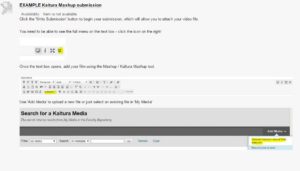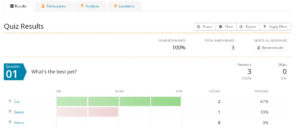The report for this year’s mobile survey has now been published where we look at the way that mobile devices, apps and interactions are used and carried out at Northampton. There were 322 respondents who took the opportunity to let us know their thoughts on the University’s mobile provision and any developments that they would like to see.
The report provides a brief summary of the main findings of the survey, including an overview of technology ownership among staff and students, trends in mobile use, facilities on campus (WiFi etc), and feedback on the iNorthampton app (which you can find in the App Store, Play Store and on the web).
You can read the report here: Mobile Survey report 2014/15 (PDF, 1024KB)
 Although we suggest using the Media Gallery on NILE for students to submit work to, there are a couple of drawbacks. You would need to add feedback and marks through a Grade Centre column and students cannot see their submitted work in the media gallery, which has led to a few anxious calls to the LearnTech helpdesk.
Although we suggest using the Media Gallery on NILE for students to submit work to, there are a couple of drawbacks. You would need to add feedback and marks through a Grade Centre column and students cannot see their submitted work in the media gallery, which has led to a few anxious calls to the LearnTech helpdesk.
The alternative is to use a standard Blackboard Assignment (not Turnitin) and allow students to use the Kaltura Mashup tool – which is part of the text box editor. This creates a Grade Centre column and students will have more confidence that they have submitted their work.
It does require clear guidance though so we have created a basic explanation (with screenshots that will work in any module), that you can paste into the description text box (use the HTML editor) to get you started.
You may be having trouble getting Kaltura screen recorder to work. It turns out that with the latest version of Java as a security feature, applets get blocked if their HTML source and jar file are on different servers. To overcome this, you need to add an exception for both https://nile.northampton.ac.uk/ and https://cdnsecakmi.kaltura.com – this does do the trick! The link below explains it in detail: http://www.java.com/en/download/help/java_blocked.xml (Thank you to Dr.Hendrix, for tracking down this solution).
How does it work on a mac? It appears to VERY picky about browser, OS and java versions. We got it to work in Safari on OSX v10.9.3 with Java 7 – running the NILE site in “Unsafe mode” by going to Safari Preferences > Security > Manage Website Settings > Select Java from the left and selecting ‘Run in unsafe mode’ for nile.northampton.ac.uk. Not ideal, but until Kaltura and the latest version of Java are in synch, it is at least possible to get it to work.
Please contact IT Services (rather than LearnTech) on ext. 3333, if you need to get this working on a uni machine.
Images and interactivity encourage students to explore content more willingly that a list of links and anything that can facilitate students to generate and share content themselves outside of the rather clunky discussion boards and blogs within NILE is always welcome.
thinglink is a free picture annotation tool website that allows content to be linked to external resources and then be embedded in your NILE site or blog. There are also editors available as IOS or Android apps.
Possible uses are as a ‘visual portal’ for students to access further information and resources or – if the thinglink is set to public – as a shared activity where students can add links and annotations to a picture as a class or as part of a group.
You can find more details and try using example thinglinks in this NILEX review.
Thanks to Belinda Green for spotting the usefulness of this app in Education and sharing.
 We’re well into assignment season and support calls are beginning to increase in relation to missing assignment submission points, incorrect settings preventing students from uploading one or more versions, apparently missing assignment submission in Grade Centre, grades being released too early (or never) and scores instead of letter grades being given to students.
We’re well into assignment season and support calls are beginning to increase in relation to missing assignment submission points, incorrect settings preventing students from uploading one or more versions, apparently missing assignment submission in Grade Centre, grades being released too early (or never) and scores instead of letter grades being given to students.
While it might be tempting to blame the computer*, it’s usually just being a little rusty that’s at the root of the problem. Please take a few minutes to remind yourself of the simple things to do before and after marking to avoid problems by looking at the SaGE survival guide.
NILE isn’t without its problems, but we must be honest with students if we are to be able to interpret their feedback on this critical part of their student experience.
* and posting this in an announcement!
 Learntech have been examining the world of free online polling tools this week in response to a number of requests. While there are several alternatives with different strengths an weaknesses, Polldaddy stands out as a flexible tool to use in a variety of situations – as a brief informal piece of formative assessment, a survey/poll or just feedback on a piece of content or activity. These items embed very well within NILE. There is a fuller description of Polldaddy on the NILE External Tools blog.
Learntech have been examining the world of free online polling tools this week in response to a number of requests. While there are several alternatives with different strengths an weaknesses, Polldaddy stands out as a flexible tool to use in a variety of situations – as a brief informal piece of formative assessment, a survey/poll or just feedback on a piece of content or activity. These items embed very well within NILE. There is a fuller description of Polldaddy on the NILE External Tools blog.
It requires an email registration on the WordPress.com site, with which it is also tightly integrated.
 Although Staff have access to Panopto to record their presentations, students have had to do things like embedding audio into PowerPoint to create multimedia presentations until now.
Although Staff have access to Panopto to record their presentations, students have had to do things like embedding audio into PowerPoint to create multimedia presentations until now.
SlidesLive can work in a very similar way to Panopto – download the recording software (for Mac and Windows), record the presentation, upload it and make some editing changes. It is slightly different in that it converts each slide to an image, the advantage being that it’s possible to replace or remove a slide using the online editor. It’s also possible to add a second ‘stream’ by using a video clip from YouTube that can be viewed alongside the slide images – the viewer can adjust the relative sizes of those two pictures.
There’s nothing to stop you adding a YouTube video directly in the online editor, then adding a number of images (these could be captions or even a transcript) which you can synchronise to the video. You’re not obliged to just capture PowerPoint, the recording of the slides is just a screen capture, so you can use other presentation software or just capture a screen (just one screen if you have two).
In its simplest form, most students would have very little difficulty in creating a basic presentation. The down side is that although uploaded presentations can be made unlisted, they cannot be downloaded so are unsuitable for summative assessments. However, presentations can be made public, perhaps as part of a portfolio or an online CV. The slide/video combination also opens up the possibility of more creative uses – critiquing someone’s video presentation or interpreting the content. 
You can find a video/slides example here. SlidesLive does require users to register using a simple email – as ever, we’d suggest avoiding the Facebook login option.
 Thursday the 23rd of October saw the appearance of the Follow Northampton app in the App Store. The app is a freely available interactive guide to Northampton, and it offers a fresh perspective on Northampton’s rich historical, architectural and cultural heritage. The app, and the associated website, were created and developed by staff and students at the University of Northampton and members of the wider Northampton community. The project leads were Dr. Drew Gray, Senior Lecturer in History, and Sabine Coady Schaebitz, Director of the Collaborative Centre for the Built Environment. Technical support and advice was provided by Rob Farmer from the Learning Technology Team, and the app was built by Chris Collinge from wedoApps. Content was developed by BA History students (Roseanne Belcher, Gabrielle Cairns, Jasdeep Dhillon and Steve Robinson), photographs were provided by a BA Photography student (Peter Holmes), and audio recordings were made of a number of (actual and honorary) Northamptonians, particularly Peter Aiers, Andy Clarke, Peter James Norman, Professor Nick Petford, and Dr. Toby Purser.
Thursday the 23rd of October saw the appearance of the Follow Northampton app in the App Store. The app is a freely available interactive guide to Northampton, and it offers a fresh perspective on Northampton’s rich historical, architectural and cultural heritage. The app, and the associated website, were created and developed by staff and students at the University of Northampton and members of the wider Northampton community. The project leads were Dr. Drew Gray, Senior Lecturer in History, and Sabine Coady Schaebitz, Director of the Collaborative Centre for the Built Environment. Technical support and advice was provided by Rob Farmer from the Learning Technology Team, and the app was built by Chris Collinge from wedoApps. Content was developed by BA History students (Roseanne Belcher, Gabrielle Cairns, Jasdeep Dhillon and Steve Robinson), photographs were provided by a BA Photography student (Peter Holmes), and audio recordings were made of a number of (actual and honorary) Northamptonians, particularly Peter Aiers, Andy Clarke, Peter James Norman, Professor Nick Petford, and Dr. Toby Purser.
The app and website were made possible by the award of a Learning Enhancement & Innovation Grant from the University of Northampton. And the great news is that work on the app and the website is set to continue, as a second Learning Enhancement & Innovation Grant was recently given, and this will allow the project to cover more locations, and will allow the inclusion of extra features into the app. We are hoping to launch a second version of the app in March 2015, which will include full offline access to the locations, improved navigation, and additional locations. A third version is planned for July 2015 which will include design and layout updates, the addition of social media sharing options, and even more locations. In the longer term, we hope to add videos, iBeacons, and augmented reality, and to make an Android version of the app.
Get the iOS app: https://itunes.apple.com/gb/app/follow-northampton/id919466161?mt=8
Visit the website: http://www.follownorthampton.co.uk
For anyone who doesn’t know, Blackboard is the software which powers NILE. We produce lots of our own Help guides and support materials and keep them under the NILE Help tab, but Blackboard also produce a lot of support which staff will find helpful. Right now, there is a YouTube playlist full of useful videos which you might want to take a look at. Some of the videos will be of more interest than others but there’s fifty-five of them so there’s sure to be some worth a peek at.
Click here to view the video playlist
If you want a suggestion then I’d point you towards the bottom of the list to Student Preview, which is a new feature on NILE. In fact, while you’re down there you could also look at how to upload Test questions to NILE using an Excel spreadsheet as it’ll make the process of setting up a Test on NILE much easier.
Have a look and get in touch with the team if you need any support from a real person.
learntech@northampton.ac.uk
Al
A number of staff are designing e-tivities (online learning activities) that require students to undertake some independent research and then share a link to the online resource with peers who can then click on the link and view the article for themselves.
If the article has been found and accessed through NELSON and the link shared with students who are not already authenticated through the University systems then they will be faced with either a dead link or an ‘Access Denied’ message.
In this situation the solution is as follows:
- Ask students to include the full reference for the journal so that potential viewers can access the article themselves via the Library ‘Find My Reference’ tool. By using this route, students will be prompted to login with their University login in order to get access to the article.
If this applies to you, please change your e-tivity instructions to ask for articles to be shared using the University of Northampton Harvard referencing style. Include this link to a Skills Hub video that shows quickly how to use the ‘Find My Reference’ tool. You might also want to include an example of how to reference a journal using the Harvard journal – guidance is available from the Help Tab in NILE.
The added bonus for the students, of course, is practice in Harvard referencing!
With thanks to Hannah Rose, Academic Librarian for helping us with the solution
Recent Posts
- Blackboard Upgrade – February 2026
- Blackboard Upgrade – January 2026
- Spotlight on Excellence: Bringing AI Conversations into Management Learning
- Blackboard Upgrade – December 2025
- Preparing for your Physiotherapy Apprenticeship Programme (PREP-PAP) by Fiona Barrett and Anna Smith
- Blackboard Upgrade – November 2025
- Fix Your Content Day 2025
- Blackboard Upgrade – October 2025
- Blackboard Upgrade – September 2025
- The potential student benefits of staying engaged with learning and teaching material
Tags
ABL Practitioner Stories Academic Skills Accessibility Active Blended Learning (ABL) ADE AI Artificial Intelligence Assessment Design Assessment Tools Blackboard Blackboard Learn Blackboard Upgrade Blended Learning Blogs CAIeRO Collaborate Collaboration Distance Learning Feedback FHES Flipped Learning iNorthampton iPad Kaltura Learner Experience MALT Mobile Newsletter NILE NILE Ultra Outside the box Panopto Presentations Quality Reflection SHED Submitting and Grading Electronically (SaGE) Turnitin Ultra Ultra Upgrade Update Updates Video Waterside XerteArchives
Site Admin



